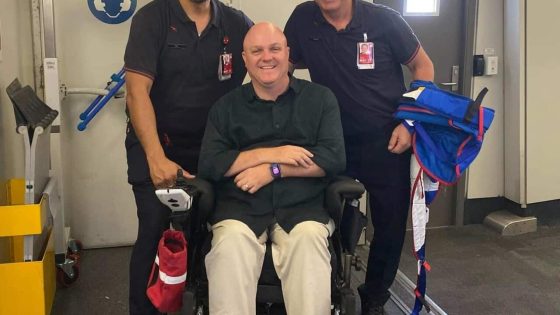Key Points
- Based on an entry level role, aged care workers can be paid 14 per cent more than disability support workers.
- The CEO of Spinal Life Australia said there needed to be measures to incentivise disability support work.
- He said fewer staff in the industry would lead to increasingly poorer outcomes for people with disability.
“It makes me feel like somewhat of a second-rate citizen, when the people who look after me aren’t treated like other members of other workforces,” says Tim McCallum, a Brisbane man who is a quadriplegic.
While aged care, and disability support workers all look after a person’s care and support needs while focusing on empowering the people being cared for, McCallum is concerned disability support workers remain underpaid compared to those in the other sectors.
He said the recent increase in wages for workers who care for children and the elderly had only exacerbated workforce shortages in disability services.
Aged care versus disability support work
According to the Fair Work Ombudsman, as of 1 July, the award rate for an entry-level aged carer working in a person’s home is $28.94, while a home care worker providing services to a person with disability would get an award rate of $25.17.
McCallum not only relies on support workers to assist him with his everyday needs, but he also works in the sector.
Tim McCallum says his disability support workers allow him to access society and contribute to it in a greater capacity. Source: Supplied / Tim McCallum
McCallum is a peer support officer at Spinal Life Australia, based at the spinal injuries unit at Brisbane’s Princess Alexandra Hospital, and shares his lived experience of spinal cord injury to help patients and their families.
He cannot see why the importance of child care and aged care work was recognised with a significant boost to wages but disability support workers were not.
“There are a lot of similarities, it is not a far stretch to say that these types of jobs are very similar in general,” he told SBS News.
Spinal Life Australia CEO Mark Townend said measures need to be introduced to support and incentivise disability workers to join and stay in the industry.
“The fact that other comparable workforces have been supported with significant wage increases in recent times will make it even more difficult to attract enough workers to the disability sector,” he said.
“We will have less and less staff coming to and staying in the industry, and this will lead to poorer and poorer outcomes for people with disability and the closure of or exit from the industry of long-established not-for-profit agencies — making the government’s job even more difficult in the long-term.”
Townend called on the government to immediately take action to reconsider its position on salary levels for workers in the disability sector and ensure further staff shortages were not caused by what he referred to as “a lack of consistency between important sectors of the Australian economy”.
He accused the government of “seeking to rely on the generosity of in trying to ensure the delivery of care and supports for people with disability in Australia”.
“The federal government is taking advantage of the good nature of organisations like ours,” he said.
Benefits of support
McCallum said his support workers, who were with him on average about six hours a day, were “the most important part of my care”.
He does not have movement in his body from his chest down and said he plans his needs around the times he would have that support.
“I wouldn’t be able to dress myself, to be able to go to the toilet, to be able to drive to work, to do just the everyday little tasks that are so challenging in my life,” McCallum said.
“So for me, my support workers are really my lifeline, and I wouldn’t be able to do the things that I do on a daily basis without their support.”
He said money spent on support workers provided what he considered a good return on investment.
“If you invest in the workers in disability, then you are going to have better social economic benefits when people with disabilities are able to rejoin the workforce, go on holiday and spend money in tourist places and live everyday lives,” McCallum said.
The government’s stance
When questioned on the matter earlier this month, Minister for the National Disability Insurance Scheme (NDIS) Bill Shorten told journalists the wages of disability support workers had increased approximately 15 per cent since Labor had been in government and said “we’ll keep working with the unions”.
Entry-level aged care workers providing in-home support earn nearly $29 an hour, while those supporting people with disabilities make $25.17 an hour at the award rate. Source: Getty / DMP
Shorten said there was “another issue which they’re taking through the Fair Work Commission about the appropriate categorisation of some of the workers in the scheme, and we’ll see where that lands”.
He has also announced funding designed to “reshape public perception and spotlight disability support work as a rewarding career path”.
He said the $300,000 initiative “celebrates Australians with disabilities as active, contributing members of their communities and seeks to elevate understanding of the significant role support workers play”.
At the same time, the government is trying to curb the amount of funding it puts towards disability support.
Laws were passed in federal parliament last week limiting the annual growth of the NDIS to 8 per cent, following fears of out-of-control spending.
With additional reporting by the Australian Associated Press.





